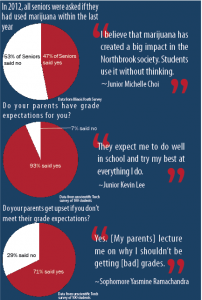Suniya Luthar, professor of psychology at Columbia University, could not believe what she stumbled upon.
In the 90’s, Luthar began studying the correlation between substance abuse and impoverished children. What she ultimately discovered was children of affluent communities are actually more at risk to use illegal substances.
“The stereotype would have it that it’s the poor kids who are doing it, but we found quite the opposite,” said Luthar. “It’s the upper-middle class kids who have significantly higher substance use.”
According to Luthar, two factors contribute to why the upper-middle class kids are more likely to smoke marijuana and drink alcohol than their lower income counterparts.
“Accessibility is definitely a factor,” said Luthar. “You have the money, you have your parents’ car and you stash it up with vodka… . But accessibility is only one part of it. There is way too much pressure. And I’m not going to blame just the parents. In a l
ot of cases, it’s the school atmosphere and the community.”
Senior Ryan Wagner also feels his community plays a role in teen substance abuse, though in a different way. He believes that pressure mainly comes from peers, though not in the same way the media displays it.
“I think the pressure isn’t the way it’s normally displayed like it is in Disney Channel or Nickelodeon or movies,” said Wagner. “It’s not that if you want to be cool, do drugs. You’re just around it a lot. You start to notice people around you becoming involved in substance abuse. I don’t think I’ve ever witnessed an ‘all the cool kids are doing it’ moment, but there is the social pressure. The weight of all the people around you doing it is being pushed on you.”

Wagner, however, has abstained from doing drugs.
In her research, Luthar found that elevated rates of drug and alcohol use by teens are directly related to their levels of depression and anxiety. Clinical psychologist Ellen Sachs Alter believes these heightened levels of anxiety and depression stem from higher expectations placed on teens in higher income communities.
“Because so much of an affluent community is skewed towards very successful people, the world looks smaller, and it looks like everybody is successful,” said Sachs Alter. “Teens sort of get this idea that ‘I’ve got to find a way to be like this, too.’”
According to Luthar, society’s definition of success impacts students’ decisions about extracurricular activities.
“What we found is that kids are doing too much,” said Luthar. “Kids generally like their extracurriculars and are happy to be doing them. What they don’t like is being made to feel like they’re miserable failures if they don’t do well.”
Senior Nate Elfant, a member of Comedy Troupe, theater productions and the gymnastics team, found himself in an overwhelming situation. After taking on too many activities, he was forced to quit Speech Team.
“I really wanted to try to find a way to keep doing it, but I was just freaking out on the inside,” said Elfant. “There was just so much going on, and I am not very good at managing my own stress. Everything just sort of started piling on, and I felt it was in my best interest to drop something.”
Luthar believes parental expectations are often at the heart of the issue. She said that too much emphasis is placed on getting into the best colleges.
“The aspirations are higher [in affluent communities],” said Luthar. “In a lower-middle class family, you go to college and that’s very good. In the upper-middle class communities, they say, ‘Wait, your kid went to what school, again?’ It’s a whole different set of expectations.”
Luthar suggests that the best solution for parents is to remind their kids that getting more involved is not always the healthiest choice.
“Yes, you all want to get into the best colleges, you want the best transcripts, you want the best GPAs,” said Luthar. “It’s almost like there needs to be a restraining force on the other end that says, ‘Sweetheart, of course you can do one more activity, but do you really need to? One extra activity is not going to make or break you, my darling. Get some sleep and spend a little time with your friends and your family.’”
Luthar also advises that students become aware of their own situations. They need to know when they have taken on too much.
“They start to think that just because they can [take on more work], they must,” said Luthar. “That takes away from their relationships, their sense of security, and their sense of balance. Too much exercise can hurt your hamstrings, right?”


